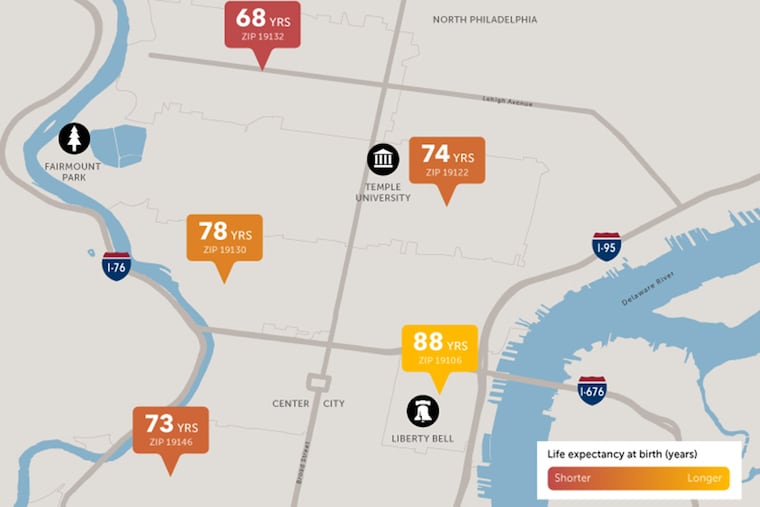How your neighborhood can impact your life expectancy in Philadelphia
Today in Philadelphia, someone living in Society Hill is expected to live approximately 88 years, while someone living in a North Philadelphia neighborhood is expected to live only 68 years, according to a study by the Robert Wood Johnson Foundation.

Studies show that there are things we can do to control our health. We know that in order to live a longer, healthier life, we should eat smart, move more, and be well. But there are some factors that can impact our life span and our overall wellness that aren't always in our control.
Where you live can greatly affect your health. Today in Philadelphia, someone living in Society Hill is expected to live approximately 88 years, while someone living in a North Philadelphia neighborhood is expected to live only 68 years, according to a study by Virginia Commonwealth University and the Robert Wood Johnson Foundation. That 20-year life expectancy gap is separated by only a couple of miles.
Your zip code shouldn't determine how long you live, but it does.
Where you are born, grow, work and age are fundamental factors of cardiovascular health over the course of your life. Living in a disadvantaged neighborhood — which can mean having less access to heart-healthy food and fewer socioeconomic resources like education and family income — is associated with a higher risk of cardiovascular disease, leading to a higher percentage of premature deaths.
Many neighborhoods in Philadelphia have an elevated risk of cardiovascular disease for a variety of reasons, including limited access to spaces to exercise, like parks, sidewalks, or gyms. Without safe places to get active, your options for physical activity are extremely limited.
Another key factor is access to healthy foods. Some neighborhoods in Philadelphia are "food deserts" which means they are miles away from grocery stores with fresh produce. Residents in these areas often resort to walking to the nearest corner store for groceries, where most vegetables or fruits are canned and might cost two times as much as processed foods, like a bag of potato chips. Residents of these neighborhoods are stretching their budgets to cover things like child care, medicine, and transportation, meaning they might have to sacrifice more expensive, healthier foods for more easily accessible foods. The issue often isn't that these residents don't know how to make the healthy choice, it's that the healthy choice isn't always available to them.
An important social determinant of health is race, particularly as it pertains to implicit or unconscious bias among healthcare physicians. This bias can result in lower quality doctor's office visits and communications between clinicians and patients, which can decrease a patient's satisfaction with care, trust in the health care system, and their compliance with the physician's recommended care. Without a foundation of trust, patients are less inclined to follow their physician's instructions and can discontinue care. This bias, inside and outside of the doctor's office, can also result in a significant amount of repeated stress, which causes wear and tear on the body and can significantly impact the cardiovascular system.
These social determinants of health in Philadelphia or in any city cannot be resolved overnight. Meaningful change will require for-profit and non-profit organizations across the city, including government, health care, education, and corporations working together to remove the barriers that prevent our communities from adopting healthy living behaviors and improve access to quality and affordable healthcare for all.
Deon W. Vigilance, M.D., M.B.A, is the chief of cardiothoracic surgery at Mercy Health System. He is also a member of the American Heart Association's Philadelphia Board of Directors focused on improving blood pressure in Philadelphia.
The American Heart Association is committed to determining and improving the role that social determinants of health play in our long-term risk of heart disease, stroke and other devastating illnesses. The Association's first ever Social Determinants of Health Conference in Philadelphia on September 24-25 will strive to remove barriers to good health by convening key stakeholders to share experiences on programs, policies and strategies aimed at reducing health inequities. For more information, visit sdohphilly.heart.org.